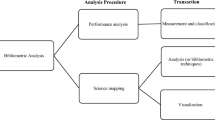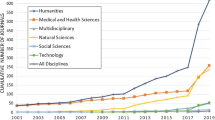Abstract
Hedges are important in academic writing since they indicate uncertainty and tentativeness about academic knowledge. However, few studies explore how hedges have changed in academic writing overtime. Among the existing studies, there is also divergent understandings. The current case study traced the diachronic development of hedges that express doubt and uncertainty in the full texts of Science research articles from 1997 to 2021. Our findings show that the use of such hedges has significantly decreased in the past 25 years in the research articles of the Journal Science. In addition, we propose that the drop of such hedges in Science research articles may be an implicit writing strategy for research promotion, and therefore may correlate with the rising linguistic positivity in academic writing. Our hypothesis was initially confirmed by the significant correlation between the evolution of hedges and Yuan and Yao’s (Scientometrics 127:1–17, 2022) sentiment scores in academic writing. Our findings may reveal a bigger picture of promoting research by adopting not only explicit strategies such as more positive language (Yuan and Yao in Scientometrics 127:1–17, 2022) but also subtle and implicit writing strategies such as reducing uncertainty. Finally, we discussed the implications of this study for peer reviewers, editors, and researchers.








Similar content being viewed by others
References
Biber, D., & Finegan, E. (1989). Styles of stance in English: Lexical and grammatical marking of evidentiality and affect. Text-Interdisciplinary Journal for the Study of Discourse, 9(1), 93–124.
Caffi, C. (2007). Mitigation. Elsevier.
Cao, X., Lei, L., & Wen, J. (2021). Promoting science with linguistic devices: A large-scale study of positive and negative words in academic writing. Learned Publishing, 34(2), 82–88. https://doi.org/10.1002/leap.1322
Dontcheva-Navratilova, O. (2016). Cross-cultural variation in the use of hedges and boosters in academic discourse. Prague Journal of English Studies, 5(1), 163–184.
Fløttum, K., Dahl, T., & Kinn, T. (2006). Academic voices: Across languages and disciplines (Vol. 148). John Benjamins Publishing.
Hu, G., & Cao, F. (2011). Hedging and boosting in abstracts of applied linguistics articles: A comparative study of English-and Chinese-medium journals. Journal of Pragmatics, 43(11), 2795–2809.
Hyland, K. (1996). Writing without conviction? Hedging in science research articles. Applied Linguistics, 17(4), 433–454.
Hyland, K. (1998). Hedging in scientific research articles. John Benjamins.
Hyland, K. (2005). Mitigation. Continuum.
Hyland, K., & Jiang, F. (2016). Change of attitude? A diachronic study of stance. Written Communication, 33(3), 251–274.
Hyland, K., & Jiang, F. K. (2021a). The Covid infodemic: Competition and the hyping of virus research. International Journal of Corpus Linguistics, 26(4), 444–468.
Hyland, K., & Jiang, F. K. (2021b). ‘Our striking results demonstrate…’: Persuasion and the growth of academic hype. Journal of Pragmatics, 182, 189–202.
Lillis, T., & Curry, M. J. (2013). 10 English, scientific publishing and participation in the global knowledge economy. In E. J. Erling & P. Seargeant (Eds.), English and Development (pp. 220–242). Multilingual Matters.
Liu, X., & Zhu, H. (2023). Linguistic positivity in soft and hard disciplines: temporal dynamics, disciplinary variation, and the relationship with research impact. Scientometrics, 128, 1–21.
Martín, P. M. (2005). The rhetoric of the abstract in English and Spanish scientific discourse: A cross-cultural genre-analytic approach (Vol. 279). Peter Lang.
Martín, P. M. (2008). The mitigation of scientific claims in research papers: A comparative study. International Journal of English Studies, 8(2), 133–152.
Millar, N., Salager-Meyer, F., & Budgell, B. (2019). “It is important to reinforce the importance of…”: ‘Hype’ in reports of randomized controlled trials. English for Specific Purposes, 54, 139–151.
Mur-Dueñas, P. (2016). Modal hedging verbs in English as a Lingua Franca (ELF) Business Management research articles. Kalbotyra, 69, 153–178.
Mur-Dueñas, P. (2021). There may be differences: Analysing the use of hedges in English and Spanish research articles. Lingua, 260, 103131.
Myers, G. (1989). The pragmatics of politeness in scientific articles. Applied Linguistics, 10(1), 1–35.
Nosek, B. A., Spies, J. R., & Motyl, M. (2012). Scientific utopia: II. Restructuring incentives and practices to promote truth over publishability. Perspectives on Psychological Science, 7(6), 615–631.
Orta, I. V. (2010). A contrastive analysis of the use of modal verbs in the expression of epistemic stance in Business Management research articles in English and Spanish. Ibérica, Revista de la Asociación Europea de Lenguas para Fines Específicos, 19, 77–95.
Poole, R., Gnann, A., & Hahn-Powell, G. (2019). Epistemic stance and the construction of knowledge in science writing: A diachronic corpus study. Journal of English for Academic Purposes, 42, 100784.
Salager-Meyer, F. (1994). Hedges and textual communicative function in medical English written discourse. English for Specific Purposes, 13(2), 149–170.
Salager-Meyer, F., Ariza, M. Á. A., & Zambrano, N. (2003). The scimitar, the dagger and the glove: Intercultural differences in the rhetoric of criticism in Spanish, French and English medical discourse (1930–1995). English for Specific Purposes, 22(3), 223–247.
Varttala, T. (1999). Remarks on the communicative functions of hedging in popular scientific and specialist research articles on medicine. English for Specific Purposes, 18(2), 177–200.
Varttala, T. (2001). Hedging in scientifically oriented discourse: Exploring variation according to discipline and intended audience. Tampere University Press.
Vassileva, I. (2001). Commitment and detachment in English and Bulgarian academic writing. English for Specific Purposes, 20(1), 83–102.
Vinkers, C. H., Tijdink, J. K., & Otte, W. M. (2015). Use of positive and negative words in scientific PubMed abstracts between 1974 and 2014: retrospective analysis. BMJ, 351, 6467.
Wen, J., & Lei, L. (2022a). Adjectives and adverbs in life sciences across 50 years: Implications for emotions and readability in academic texts. Scientometrics, 127(8), 4731–4749.
Wen, J., & Lei, L. (2022b). Linguistic positivity bias in academic writing: A large-scale diachronic study in life sciences across 50 years. Applied Linguistics, 43(2), 340–364.
Wheeler, M. A., Vylomova, E., McGrath, M. J., & Haslam, N. (2021). More confident, less formal: Stylistic changes in academic psychology writing from 1970 to 2016. Scientometrics, 126, 9603–9612.
Yang, Y. (2013). Exploring linguistic and cultural variations in the use of hedges in English and Chinese scientific discourse. Journal of Pragmatics, 50(1), 23–36.
Yuan, Z. M., & Yao, M. (2022). Is academic writing becoming more positive? A large-scale diachronic case study of Science research articles across 25 years. Scientometrics, 127, 1–17.
Acknowledgements
The authors would like to extent our greatest gratitude to the editor and the reviewers for their professional and constructive comments, especially about the conceptual connections between linguistic positivity bias, hyping, confidence, and research promotion, which would not have been made clearer without their help.
Author information
Authors and Affiliations
Corresponding author
Ethics declarations
Conflict of interest
The authors declare that they have no conflict of interest.
Ethical approval
Ethical approval corpus data used in the current research is collected through institutional access, and hence no ethical concerns are reported.
Rights and permissions
Springer Nature or its licensor (e.g. a society or other partner) holds exclusive rights to this article under a publishing agreement with the author(s) or other rightsholder(s); author self-archiving of the accepted manuscript version of this article is solely governed by the terms of such publishing agreement and applicable law.
About this article
Cite this article
Yao, M., Wei, Y. & Wang, H. Promoting research by reducing uncertainty in academic writing: a large-scale diachronic case study on hedging in Science research articles across 25 years. Scientometrics 128, 4541–4558 (2023). https://doi.org/10.1007/s11192-023-04759-6
Received:
Accepted:
Published:
Issue Date:
DOI: https://doi.org/10.1007/s11192-023-04759-6




